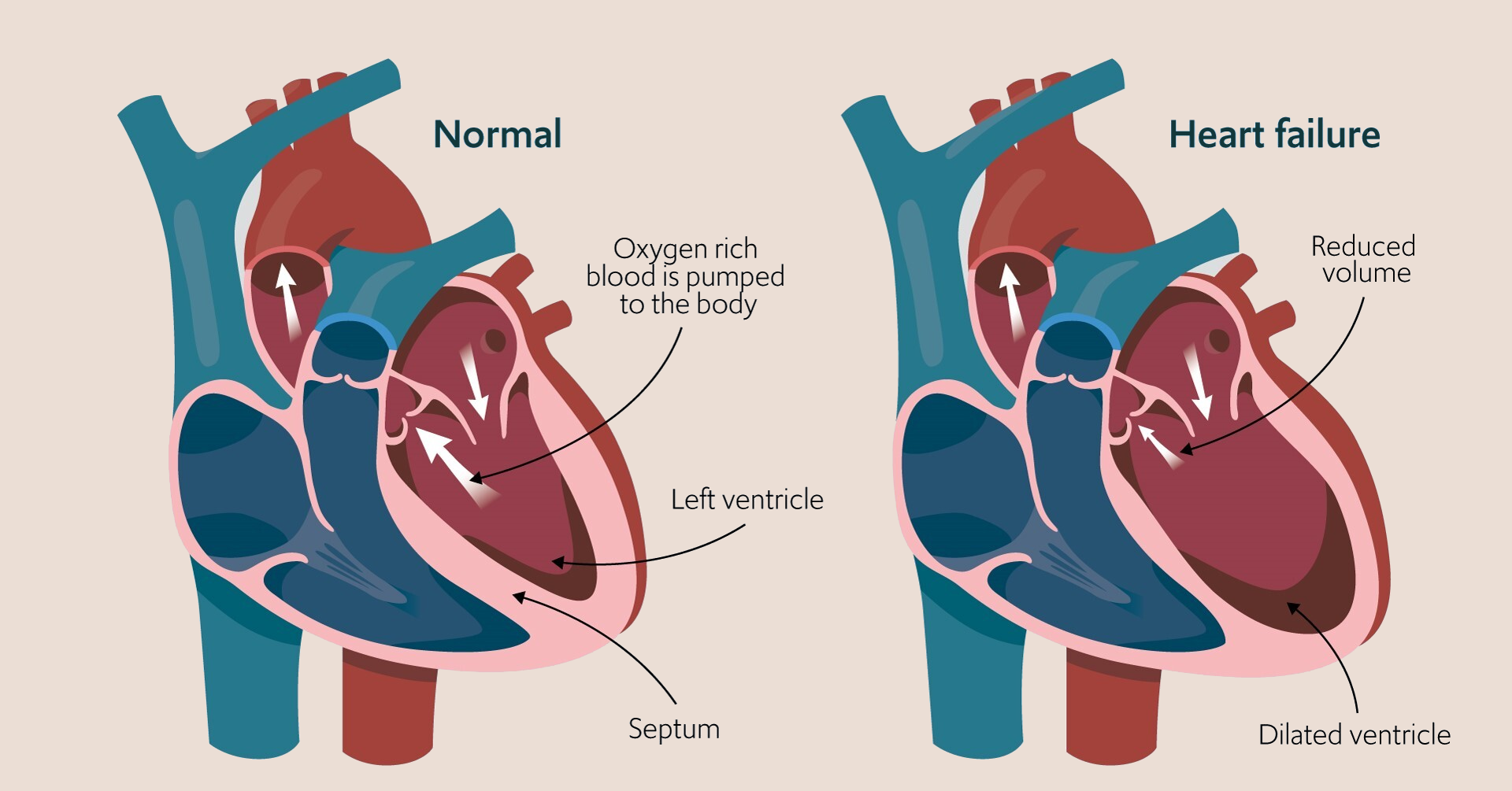Congestive heart failure is when your heart can’t pump blood sufficiently to meet your body’s needs. There are 4 main symptom stages of congestive heart failure, and in this article, we discuss the causes and characteristics of each stage, as well as the treatments available to manage the condition.
What is congestive heart failure?

Congestive heart failure is caused by the heart’s inability to pump blood round the body properly.
“Congestive heart failure – commonly referred to as simply heart failure – is when the heart can’t pump blood around your body properly. This usually occurs due to the heart becoming too stiff or weak. Blood can back up, causing fluid to build up in the lungs, which leads to symptoms such as fatigue, shortness of breath, weight gain, and swelling of the legs, feet and stomach,” explains consultant cardiologist, Dr Savvas Hadjiphilippou.
While it is a long-term condition that can gradually get worse over time, there are many ways to control and improve the symptoms of congestive heart failure and the condition.
Congestive heart failure causes
The older you are, the more you are at risk of developing congestive heart failure. Congestive heart failure can be caused by a range of conditions, including:
- heart attack: which weakens your heart’s ability to pump blood by damaging the heart muscle
- coronary artery disease: the build-up of fatty deposits in your arteries reduces blood flow and can result in heart attacks
- congenital heart disease: heart issues which are present from birth
- cardiomyopathy: diseases of the heart muscle which stiffen, enlarge or weaken the heart
- high blood pressure (hypertension): one of the most common causes of heart failure due to stiffening of the heart
- diabetes: having high blood sugar can damage the blood vessels and the nerves controlling the heart increasing the risk of coronary artery disease
- kidney disease: poor kidney function puts strain on the heart
- arrhythmia: irregular heart rhythms can put strain on the heart’s ability to pump blood
- certain medications: such as drugs used for chemotherapy can damage the heart
- smoking: chemicals in cigarettes can cause the blood to thicken and clot inside arteries and veins increasing the risk of coronary artery disease
- taking illegal recreational drugs: powerful and addictive drugs like cocaine can constrict the heart’s blood vessels, which causes the heart to work faster and harder. This can lead to heart conditions such as arrhythmias and heart attacks
- being obese: obesity has been linked to heart failure in 14% of women and 11% of men.
What are the 4 symptom stages of congestive heart failure?
Doctors commonly describe the severity of heart failure based on the patient’s symptoms and their impact on the patient. The most commonly used classification is called the New York Heart Association (NYHA) Functional Classification and there are four categories:
- No notable symptoms and no limits in activity.
- Mild symptoms with slight limitation in activity.
- Significant limitation in activity but no symptoms at rest.
- Symptoms are present at rest with severe limitations in activity.
As congestive heart failure can be a condition that worsens gradually, the four stages allow the severity of the condition and its symptoms to be described and monitored.
Stage 1 congestive heart failure
“During the first stage of congestive heart failure, you won’t experience any symptoms, even during physical activity. You will be classed in stage 1 if you have cardiac disease but this is not causing you any symptoms” explains Dr Hadjiphilippou.
At this stage, the condition can be managed through lifestyle changes, such as exercising regularly, sticking to a balanced diet, limiting alcohol intake and stopping smoking. Your condition will be monitored, and you may be given heart medications such as:
- beta blockers (β-blockers)
- angiotensin-converting enzyme inhibitors (ACEIs)/angiotensin receptor neprilysin inhibitors (ARNIs)
- mineralocorticoid receptor antagonists (MRAs)
- sodium–glucose co-transporters 2 inhibitors (SGLT2is)
Stage 2 congestive heart failure
“The second stage of heart failure means you are typically comfortable at rest, but you may experience mild symptoms such as shortness of breath during physical activity,” explains Dr Hadjiphilippou.
During this stage, your medications may be adjusted to improve your symptoms and lifestyle changes will be emphasised. There is also the possibility of an intervention or surgical procedure in circumstances such as you having congenital heart disease or valve disease.
Stage 3 congestive heart failure
“In the third stage, you may be comfortable at rest, but notice significant limitations during physical activity. Even light exercise can bring on symptoms such as heart palpitations, fatigue and shortness of breath. You may also experience symptoms such as weak legs, swollen feet, legs and stomach,” explains Dr Hadjiphilippou.
Treatment at this stage is more complicated, encompassing the same treatments as stages 1 and 2, as well as potentially a water pill (diuretic), and restricting fluid intake in your diet.
You may be asked to track your weight every day, keeping a close eye on weight gain or loss greater than around 1kg to 1.5kg. A biventricular pacemaker or implantable cardiac defibrillator may be recommended – these are small implantable devices for the detection and treatment of abnormal heart rhythms.
For more information, please read our article: ‘What is a pacemaker?’.
Stage 4 congestive heart failure
“By the fourth stage, any form of physical activity is likely to bring on symptoms, and symptoms are present even at rest,” explains Dr Hadjiphilippou.
Stage 4 symptoms are more severe, and include:
- chest pain
- rapid breathing
- fainting
- discolouration of the skin (the skin may turn blue)
At this stage, there are options which can help to manage the condition and improve quality of life. Each treatment option will come with its benefits and risks, which will be discussed with your doctor. Treatments include those suitable for Stages 1, 2 and 3, as well as advanced treatment options such as palliative care, intravenous inotropic drugs and heart transplant for those that are suitable.
Research shows that the survival rates of heart failure are as follows:
- After 1 year – 87%.
- After 2 years – 73%.
- After 5 years – 57%.
- After 10 years – 35%.
A person’s age can also impact prognosis, with people over the age of 65 having a lower survival rate than younger people. It’s important to seek medical help as soon as you notice any symptoms.
Book a heart palpitations appointment
If you suffer from any symptoms, have a history of heart disease or heart failure in your family, or haven’t had a heart check in a while, you should get tested.
From heart tests to treatment, you can rely on state-of-the-art facilities and an unmatched, personalised service at our hospitals. Contact our team to book an appointment.
Related content
-
Cardiology
Our specialists are continuously innovating in minimally invasive cardiology procedures and improving care delivery.
-
Diagnostic tests for heart conditions
We offer a range of diagnostic tests at our state-of-the-art facilities.
-
Pacemakers and implantable cardioverter defibrillators (ICDs)
Pacemakers and ICDs are different types of implanted electronic devices that are capable of regulating heart rhythm disturbances.
-
Heart failure
Heart failure occurs when the heart stops being able to pump blood around the body in an efficient way.
Contact us
Call us on 020 3131 5130 to book your appointment today.
Alternatively, fill in our online enquiry form below and we will get back to you as soon as we can.
